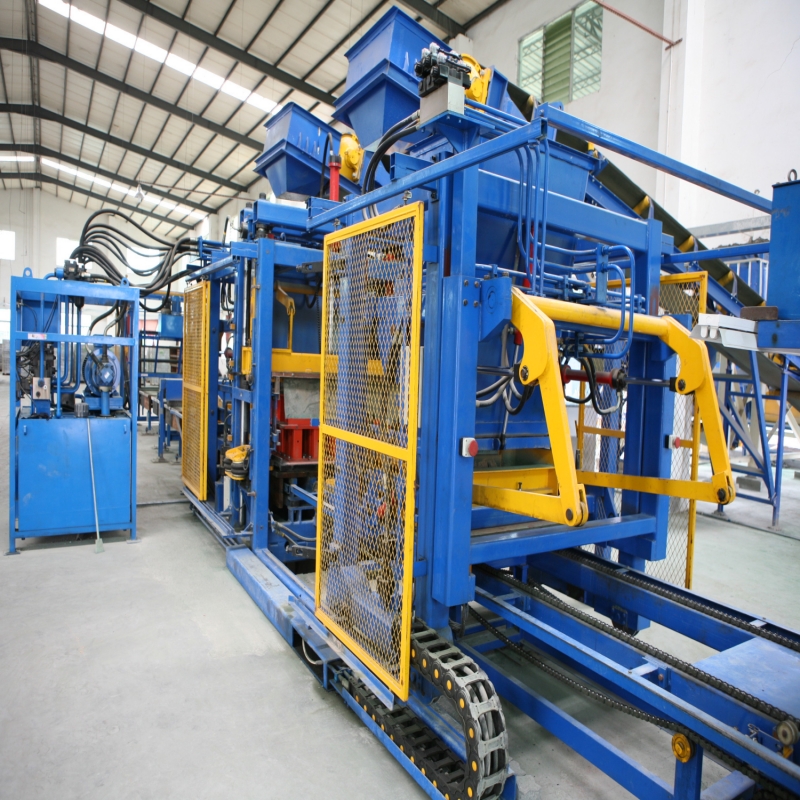The cost-effectiveness of a paver block making machine is closely related to its performance in several ways:
- Production Efficiency: A cost-effective paver block making machine should be able to produce a high volume of quality paver blocks efficiently. The machine’s performance in terms of production speed, cycle time, and throughput directly affects its cost-effectiveness. Higher production efficiency means more paver blocks can be manufactured within a given time frame, maximizing output and revenue potential while minimizing labor and operational costs.
- Material Utilization: The machine’s ability to optimize material usage and minimize waste contributes to its cost-effectiveness. Efficient material handling and batching systems ensure that raw materials such as aggregates, cement, and pigments are used effectively, reducing material wastage and associated costs. Additionally, machines with precise control over material distribution and compaction can produce paver blocks with consistent dimensions and quality, further enhancing material utilization.
- Energy Efficiency: Energy consumption is a significant operating cost for paver block making machines. Cost-effective machines are designed to minimize energy usage while maintaining optimal performance. Energy-efficient motors, heating elements, and control systems help reduce electricity consumption, lowering operational expenses and enhancing overall cost-effectiveness.
- Maintenance and Downtime: The machine’s reliability, durability, and ease of maintenance directly impact its cost-effectiveness. paver block making machine Machines that require minimal maintenance and downtime for repairs or servicing are more cost-effective in the long run. High-quality components, robust construction, and effective lubrication systems contribute to extended machine lifespan and reduced maintenance costs.
- Labor Efficiency: Cost-effective paver block making machines often feature automation and advanced control systems that streamline production processes and reduce reliance on manual labor. Automated material handling, mold filling, compaction, and curing systems minimize labor requirements, improve workflow efficiency, and reduce labor costs per unit of production.
- Product Quality and Durability: The performance of a paver block making machine in producing high-quality, durable paver blocks is crucial for its cost-effectiveness. Machines that consistently produce blocks with precise dimensions, uniform color, and excellent compressive strength minimize rejection rates and customer complaints, leading to higher customer satisfaction and repeat business.
- Total Cost of Ownership: The total cost of ownership (TCO) considers not only the initial purchase price of the machine but also operational, maintenance, and lifecycle costs over its lifespan. Cost-effective paver block making machines offer favorable TCO by delivering reliable performance, low operating costs, minimal downtime, and high productivity throughout their operational life.
In summary, the cost-effectiveness of a paver block making machine is directly linked to its performance in terms of production efficiency, material utilization, energy efficiency, maintenance requirements, labor efficiency, product quality, and total cost of ownership. Machines that excel in these aspects offer superior value proposition to manufacturers and contribute to their long-term success in the market.
What are the factors that affect the ease of maintenance and serviceability of a paver making machine?
Several factors can affect the ease of maintenance and serviceability of a paver block making machine:
- Accessible Design: Machines with accessible design features, such as easily removable panels, hinged covers, and quick-release mechanisms, facilitate convenient access to internal components for maintenance and servicing. paver making machine Accessibility to critical parts such as molds, motors, conveyors, and hydraulic systems simplifies inspection, repair, and replacement tasks, reducing downtime and labor requirements.
- Modular Construction: Modular construction allows for the separation of machine components into interchangeable modules or assemblies. This enables easy removal and replacement of malfunctioning or worn-out parts without the need for extensive disassembly or specialized tools. Modular designs also facilitate component upgrades, modifications, and customization to meet changing production requirements.
- Clear Documentation: Comprehensive and user-friendly documentation, including operation manuals, maintenance guides, parts catalogs, and troubleshooting instructions, enhances the ease of maintenance and serviceability. Clear illustrations, diagrams, and step-by-step procedures help operators and maintenance personnel understand the machine’s components, functions, and maintenance requirements, enabling them to perform tasks efficiently and accurately.
- Standardized Components: Standardization of components, such as bearings, belts, seals, and hydraulic fittings, simplifies maintenance and servicing by reducing the variety of spare parts needed and streamlining inventory management. Compatibility with commonly available off-the-shelf parts ensures prompt availability and cost-effective replacement of components, minimizing downtime and maintenance costs.
- Built-in Diagnostics: Advanced diagnostic systems integrated into the machine provide real-time monitoring and analysis of performance parameters, such as temperature, pressure, vibration, and fluid levels. Built-in diagnostics alert operators and maintenance personnel to potential issues or anomalies, enabling proactive maintenance and timely intervention to prevent equipment failure or damage.
- Remote Monitoring and Control: Remote monitoring and control capabilities allow operators and service technicians to access machine data, diagnostics, and control functions from a centralized location or via mobile devices. Remote monitoring enables proactive fault detection, troubleshooting, and software updates, reducing the need for onsite visits and optimizing maintenance efficiency.
- Training and Support: Comprehensive training programs and technical support services provided by manufacturers equip operators and maintenance personnel with the knowledge and skills required to effectively maintain and service the paver block making machine. Training sessions covering machine operation, paver block machine price maintenance procedures, safety protocols, and troubleshooting techniques ensure competent and confident handling of maintenance tasks.
- Preventive Maintenance Scheduling: Automated preventive maintenance scheduling systems help plan and manage routine maintenance tasks, such as lubrication, cleaning, inspection, and component replacement, based on predefined intervals or machine usage metrics. Scheduled maintenance activities reduce the risk of unexpected breakdowns, extend equipment lifespan, and optimize machine performance and reliability.
By considering these factors and incorporating design features and support services that prioritize ease of maintenance and serviceability, manufacturers can enhance the usability, reliability, and longevity of paver block making machines, ultimately benefiting end-users with reduced downtime and lower lifecycle costs.
